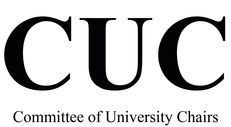A Guide for Members of Governing Bodies – Foreword
CUC Foreword
The CUC recognises the importance of sustainability in the context of an institution’s financial sustainability, its competitive position, and the wider context of how an institution plays its part in supporting the global agenda for a strong, healthy and just society living within environmental limits.
The Higher Education Code of Governance (1) identifies the key values and practices of effective governance in UK higher education institutions, which underpin institutional success. The Code makes clear that governing bodies have a responsibility to support the sustainability of their institution.
I believe that the sector has made enormous strides in this area over the last few years, but there remains much more to do. We need to ensure that all higher education staff and students can live, study and work in a sustainable environment as well as develop and use the skills and understanding required to contribute to global sustainability throughout their careers.
I welcome the publication of “Sustainability: Key to Institutional Success” and am grateful to all of those who have contributed to its development. I believe that by considering the ideas and examples set out in this document, universities will be well placed to effectively prepare their institution for the sustainability challenges of the 21st century.
Chris Sayers, Chair of CUC
Rathbones Foreword
Good governance is critical to the success of higher education institutions, with governors charged to ensure the sustainability of their institution. While a focus on financial viability is key, adopting a fuller definition of sustainability to include people and planet is necessary to secure long-term success.
With public trust in institutions across all sectors at an all-time low, (2) leaders recognise sustainability can play an invaluable role in maintaining the reputation of an institution. While higher education is at the forefront of knowledge discovery, it lags behind the business sector in terms of re-framing sustainability as a strategic imperative. Over 60% of business executives surveyed consider a sustainability strategy necessary to maintain competitiveness (3) – by reducing risks, creating opportunities and aligning an organisation with stakeholder needs. Put simply, sustainability is the key to long-term organisational health.
Sustainability thinking is no longer niche, with some 193 countries adopting the United Nations 2030 Global Goals for Sustainable Development (the SDGs). As Unilever’s CEO Paul Polman pointed out, embracing the Sustainable Development Goals as a strategic goal is a ‘win-win’ as “… it is not possible to have a strong, functioning business in a world of increasing inequality, poverty and climate change”.(4)
Universities contribute to addressing the societal challenges embedded in the Sustainable Development Goals through their teaching, research and public service. Aligning the long-term strategy of your institution to better serve global society can do more to secure institutional resilience than any amount of risk-based due diligence.
Matt Crossman, Engagement Manager, Rathbone Greenbank








 Except where otherwise stated, content on this site is
licensed under a Creative Commons Attribution 3.0 License.
Except where otherwise stated, content on this site is
licensed under a Creative Commons Attribution 3.0 License.
